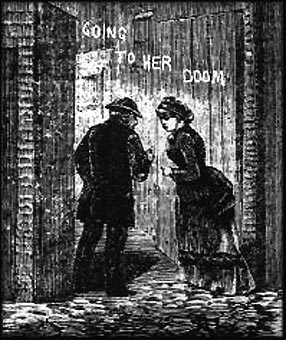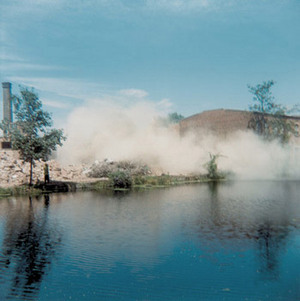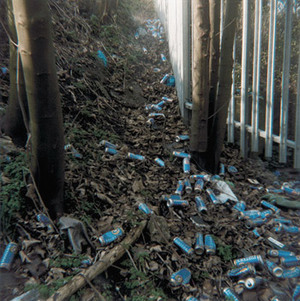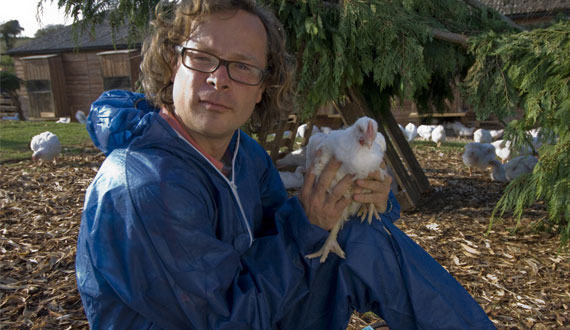January 23, 2008
But if we truly have anything of value to learn from your world of tomorrow, then it may simply be this:

- ...the notion of absolute consumer-driven self-obsession, unhindered by taste, restraint, or any concept of moral consequence.
The estimable Lawrence Miles returns, with a new Aethernet Steampunk Satire conceit...
- I understand that aethernet "blogs" of a controversial nature are something of a current fashion, and that in one instance, the musings of a particularly supple London harlot become a successful televisual production entitled The Secret Diary of a Call-Girl. Since even the greatest engineers of Victoria's Britain failed to develop a means by which something could still qualify as "secret" after being published on the world's most accessible information medium and then broadcast to every home in the nation, I once again find myself impressed by twenty-first-century ingenuity, and remain curious as to how this programme was prevented from falling into the hands of foreign powers.
January 22, 2008
January 19, 2008
They are rebuilding the city... Yes, always...
 |  |
"Perhaps you'd fancy a few miles moving through the Hackney-Stratford marshes: a complex transitional ecology of CGI imagery, doomed allotments and virtual arcadias?" So Iain Sinclair is said to have asked Robert Macfarlane before the pair set off on a tour of the areas of East London currently being 'developed' by the 2012 SF Capital megamachine. I can't help comparing Macfarlane's report of his and Sinclair's journey through the lower Lea Valley territory with the wonderful film of the construction of BBC Television Centre that Owen linked to a few weeks back.
Macfarlane and Sinclair were walking the Stalking ground of Stephen Gill, whose eerily powerful photographs provide an eerie record of the de-Zoning of the area. The theme of Gill's photographs, Macfarlane suggests, is 'the imminence of mass construction'. The film of the BBC television centre shows construction itself, soundtracked by the BBC Radiophonic Workshop. 2012 is a fatal date for Television Centre, as it is for the lower Lea valley, for it is 'by the end the financial year 2012/13' that the BBC plans to sell off the building.
BBC Television Centre is a relic of popular modernism, while the thriving improvised ecologies of the lower Lea Valley were thrown up as a side-effect of modernist development. ‘At least a third of the images in [Gill’s] Archaeology in Reverse are of plants,’ Mcfarlane tells us, ‘prospering in the foreground or seething in the background. A stand of phragmites hushes in the wind. Fields of Japanese knotweed are slashed by ODA workmen. Giant hogweed is cut, stooked and burned. Convolvulus spirals up a chain-link fence. One extraordinary photograph shows the trunk of an ash pleaching slowly round an iron railing. The tree resembles a gummy mouth, gradually eating back the metalwork.’ The lower lea Valley – London’s Tarkovsky scurf space - is full of such images: their power arises from the combination of vegetation and dereliction, the seductive lure of the overgrown. As Owen has acerbically noted, the only thing to be welcomed about the 2012 project is that, once the Capital-Spectacle has departed the glittering arcades, the wind will whistle through the dereliction of a new Zone. ‘Whatever occurs here, these images suggest, whatever is lost to this development, will only be temporary,’ Macfarlane observes. ‘Given time, the wild will reclaim the park and its structures.’
Gill’s photographs – and other similar records, in writing and on film - are the only means by which the lower Lea Valley’s unmanmade Zone can now be preserved, the march of the 2012 meganaut being as implacable as it was un-invited. Speaking of 'other records', I should note that Macfarlane's lower Lea Valley travelogue produced a very personal hauntological charge. Macfarlane and Sinclair's route - '[f]rom our first encounter with the fence, we walked widdershins: south past the Big Breakfast House, east over Stratford marsh, north up through Stratford New Town, before returning west across Hackney Marshes' - took in much of the territory that me, Heronbone, Woebot, Nick Kilroy and others used to walk in our bloggers' get-togethers. Heronbone remains perhaps the greatest poet of the lower Lea Valley, but he departed the blogosphere long ago; Woebot has just announced his online retirement, while Nick sadly died, his own photographs now constituting one of the ways in which the under-destruction lower Lea Valley is preserved.
Preserving Television Centre, meanwhile, would be a meaningless act of museumification. What mattered was a certain notion of public broadcasting - and more broadly public service - which has long since been marginalised in the 'radically reformed' BBC.
The concept of 'radical reform' perfectly captures postmodernity's tendency to pursue the same through difference. The paradox in which 'an unparalleled rate of change on all the levels of social life' goes alongside 'an unparalleled standardization of everything - feelings along with consumer goods, language along with built space - that would seem incompatible with such mutability' was the subject of Jameson's great essay 'The Antinomies of Postmodernity'. ‘The Antinomies of Postmodernity’ is at least the equal of his ‘Postmodernism and Consumer Society’ in its acute purchase on the current malaise. The temporal paradox that Jameson was coming to terms with in that essay is one that is now liable to be taken for granted, not so much analysed or lived with. Despite - or rather because of - the premium put on change and dynamism in late capitalism, Jameson argues, 'no society has ever been so standardized as this one, ... the stream of human, social and historical temporality has never flowed quite so homogenously.' This is an inversion of modernism, where 'prefabicrated modularization' gave rise to 'miraculous rebuildings', where (bog)standardization – of education, of production – produced a cultural diversity.
'Diversity' and 'choice' are of course the very names by which today’s homogeneity goes. Yet it is by now clear that it is not 'paternalistic' but consumer-driven broadcasting that leads to infantilisation, and that a proliferation of barely-rejigged formats does not constitute choice. The twinning of the Radiophonic Workshop and Television Centre perfectly illustrates that condensation of The Weird and the Public, of the aberrant and the bog-standard, that Ghost Box’s re-dreamings of public service radio idents and comprehensive school textbooks have invited us to recall. If there were a soundtrack to the BBC's selling off of Television Centre, it would be provided by Murray Gold, the composer who writes the music for the new Dr Who. Where the Radiophonic Workshop's music was atonal and anempathic, Gold’s is cloying and reassuring. You couldn't ask for a better substantiation of Adam Curtis' claim that 'television now tells you how to feel' than Gold's hysterically shrieking orchestra. The Corporation’s flagship figure, David Tennant’s beaming, emotionally incontinent Doctor, is the symbol of the de-Weirded BBC and, more broadly, of the ‘gleaming science-fictional stasis’ (Jameson) which neo-liberalism has inaugurated and administrated.
At The Weird symposium, China argued that the Weird and the hauntological stand in a relation of non-dialectical opposition. (He characterised M R James – whose work played such an important part in the BBC of the 1970s, of course – as a writer who oscillated between the two poles). Yet, repressed, suppressed and forgotten in the hyper-bright halls of the postmodern, the Weird has itself become a trace, a relic inducing hauntological yearnings. It is the Weird that haunts Ghost Box and Mordant Music’s spectral broadcasting stations.
What is important, now, is not simply a nostalgia for an earlier time, but a rescuing of what was valuable in that era from its slandering in the false memory that neo-liberalism has installed and naturalised - a task characterised by Dan on The End Times as 'reinterpreting the past in order to find a way out of the present'. From the commanding heights of the post 89 End of History, the pre-Style, pre-consumer 70s represents in time what the Soviet Union represents in space: stagnancy and shortage. Yet public funding yielded more than the dreary State propaganda or dour Reithian austerity that neo-liberalism painted as its sole products. In the December issue of Sight and Sound, Ian Christie reinforced the point I made about Tarkovsky in Marxist Supernanny:
- Tarkovsky is now generally acknowledged to be a great artist… But it is worth recalling just how much his genius owed to the limitations and freedoms of being a Soviet film maker. Back in 1981, well before the Soviet edifice began to crumble and before his own defiant departure into exile, Tarkovsky walked a tightrope between being the USSR’s highest profile director and a standing reproach to its values … Russian culture of the Soviet era was Tarkovksy’s culture, despite his contempt for its pettiness and mendacity.
(Incidentally, to correct an understandable misunderstanding created by the 'Marxist Supernanny' post, and seized upon by Ghost of a Flea, I should make it clear here that the evidence for my claim that Tarkovsky acted as an entrepreneur for Hollywood was not Soderbergh’s Solaris – which, after all, could be considered a new adaptation of Lem’s novel rather than a remake of Tarkovsky’s film – but his impact on Ridley Scott’s Alien and Blade Runner.)
Once again, the point is not to indulge in Old Left nostalgia for the Soviet state apparatus. The point is to correct the misapprehension that neo-liberalism has successfully propagated that only capitalism can produce a vibrant culture. Not only is it by now clear that the ‘dynamic’ culture of ultra-precarious capitalism would never produce something like Tarkovsky’s films, it is beginning to appear that - as Jameson suspected over a decade ago - unchallenged and unsheathed capitalism cannot produce any sort of vibrant culture at all, only endless variations on a drearily glossy theme.
(Since I've mentioned 'Marxist Supernanny': thanks to Drinked Soaked Trotskyist Popinjays who very kindly described the post as 'like Charlie Brooker with a PhD'. I can't ask for better than that!)
(Also 'Marxist Supernanny'-related: hurrah for this...)
January 11, 2008
'It's not about class, it's about ethics'

A rare display of class resentment on TV this week - on Hugh Fearnley-Whittingstall's Chicken Run programmes on Channel 4. The programmes were enthralling not because of their ostensible topic - the welfare of chickens in intensive farming - but because of their running subtext of class antagonism. The ambivalent role of old school liberalism was to have at least allowed class into its reality picture, as a kind of blind spot that is acknowledged by the very conspicuousness of its repression. So it was here, where a kind of Fourieresque paternalist liberalism confronted one of the effects of (the of course un-named and unidentified) neo-liberalism's anti-paternalism.
Fearnley-Whittingstall's aim to transform his local town, Axminster, into 'Britain's first free-range chicken town' was dogged by a single mother, Hayley, who, although she had enthusiastically participated in a project which saw residents of council estate raise and kill their own chickens, resolutely refused to stop buying '2 for £5' chickens in Tesco. Even after she saw how chickens were kept on the intensive chicken factory that Fearnley-Whittingstall had set up to demonstrate the conditions that cheap chicken are raised in (none of the intensive poultry producers would allow him to film in their establishments), she maintained that feeding her children on a limited budget was more important than the welfare of chickens. There was something heroic about the way in which she resisted the consensual sentimentality to which the others on her estate - cast in Fearnley-Whittingstall's narrative as, if not noble savages, then easily ennobled 'common people' - seemed to quickly submit.
On BBC1's painfully Partridgesque One Show, Fearnley-Whittingstall said that he didn't want to 'flinch' from the issues that Hayley raised , but that chicken welfare was 'not about class but ethics.' The immediate temptation here is to indignantly ask if class is not also about ethics, but this should be resisted, since Marx's claim that 'ethics' is a mystificatory bourgeois category has never had more purchase than now, when 'the ethical' blatantly serves as both a substitution for, and a means of warding off, the political-economic. 'Ethical consumerism' is posited as the (only) means by which people can 'make a difference', but of course consumers cannot make one jot of difference to the systemic causes of misery (in humans or chickens), they can only make a 'choice', where 'choice' - divested of any existentialist charge - carries the meaning assigned none to it by neo-liberalism. Choice, in this rendition, is, (second) naturally, a choice between commodities. Like neo-liberalism itself, ethical consumerism presupposes the Smithian invisible hand even as it accepts that it occasionally needs jogging in the right direction by enlightened 'good sorts'.
In 'Transformations of the Image in Postmodernity', Jameson warned of the depoliticizing function that the return of ethics plays in the stablising of the capitalist reality picture. 'For ethics,' Jameson writes in ', 'is irredeemably locked into the categories of the individual, when not in fact of individualism as such: the situations in which it seemed to hold sway are necessarily those of homogenous relations within a single class. But only those whose thinking has been irreperably damaged by empiricism can imagine that to pronounce the end of ethics (beyond good and evil!) is tantamount to recommending wholesale violence and the Dostoyevskyan "anything goes", rather than a sober historical judgment on the inadequacy of certain mental categories.' The current capturing (and attempted depoliticization) of Green issues by the capitalist Matrix - and the attendant emphasis on lifestyle and health - is an exemplary demonstration of Zizek's Lacanian reversal of Ivan Karamazov's 'if there is no God, everything is permitted': everything is permited, on the grounds that it is deprived that which made it enjoyable. But, as I've argued before, it is imperative to reject Zizek's Oedipal Catholicism (something is enjoyable because it is forbidden), which is only the dialectical complement of today's hedonic conservatism, or ascetic consumerism. Hastily festooned with Green and Fair Trade slogans, the Capitalist Matrix looks like a bad synthesis of the two worlds in Ursula Le Guin's The Dispossessed - the one, earnest, communal-orientated and austere; the other, pleasure-driven, intoxicating and intoxicated, slick but sick. There's something queasily appalling about being sold moralism with your M and S pornfood.
Needless to say, neo-liberal Britain has more than been 'damaged by empiricism', to recall Jameson's phrase. Fearnley-Whittingstall's programme, like Jamie Oliver's upcoming programme tonight, and the absurdly sensation-mongering-mawkish-moralising 'Kill It, Cook It, Eat It' on BBC Three (a programme so breathtakingly Brass Eye-like that it makes parody obsolete), claim that it is making people 'experience' the 'reality' of meat production. But that 'reality' is not available to experience, only to cognition. The crowding of animals into tiny spaces - and its complement the economic inequality that means that many can only afford cheap meat - is of course an epiphenomenon or a symptom, not the structural cause or Thing itself, Capital, which is far too abstract to be experienced as such.
Fearnley-Whittingstall exemplifies that combination of charm and bullish certainty which is characteristic of the English Master Class at their most winning and and their most irritating. Describing himself on the One Show as 'a posh boy with a farm' Fearnley-Whittingstall is more ingenuousness about his class background than Jamie Oliver, which meant that the resistance and class resentment his 'Chicken Out' campaign faced was different to that encountered by Oliver when he took on the problem of school dinners a few years back. Oliver was famously resisted by parents who passed fast food through the fences of schools that had converted to more nourishing meals, but whether this was an act of class defiance to bourgeois do-gooding or an act of entrepreneurialism, or some combination of both, was unclear.
In Fearnley-Whittingstall's programmes this week, the class aporia was insistent. The programmes devoted quite a bit of screen time to Axminster working class voices that were sceptical of his motives and openly hostile to his 'organic' and 'free range' agenda, which they rightly saw in class terms. To many, myself included, the 'organic' and 'ethical' labelling of products produces a smart of resentment; this is expensive posh food, and our being hectored to purchase it is another example of the middle class lecturing the poor on how to behave, one more consequence of the 'ethicization' - or depoliticization - of postmodern British life. The abstract contours of global Capital, and its handmaiden, neoliberalism, necessarily appear in Fearnley-Whittingstall's and Oliver's vision only negatively, or rather in an inverted way, the elephant in their farms, seen from the wrong end of the telescope, from the consumer's point of view. It would only take a nudge - albeit a massive political ontological leap - for the condition of chickens to be connected with the superbugs raging through privatized hospitals, with the mental health plagues and with the homicidal youth violence that stalks former public spaces. But what these campaigns demonstrate is the continuing power of television and of paternalism, albeit of a liberal stripe. One positive side-effect of Fearnley-Whittingstall's chicken run campaign was the fostering of a a collective project. 'There's nothing else round here,' one participant glumly noted. One can only speculate what a collectivist, as opposed to a liberal, 'paternalism' - we still await the proper de-familialized and de-patriarchised term - might achieve.
January 10, 2008
Rollercoaster rides

Further thoughts on Bassline....
UPDATE
Dominic responds:
- "The hardcore continuum had frozen into a permanent midwinter that appeared to be a terminal condition..."
You don't say...
Great article, tho': I agree that bassline house is joyous, and for the reasons you discuss. I loved the vocals on "heartbroken" because they were deadpan without being affectless - plangently normal, you might say - and the acrobatics were in the vocal science rather than the singer's technique (there's a distant echo of Mel & Kim in there). It's obvious no-one's let an AutoTune plug-in within a hundred miles of them, too...
Couple of things I've noticed:
i) Use of filtered square waves in the bass lines. These sound dated, 8-bit, BBC-micro-ish, but also (because of the filter envelope, which gives it a sort of duck-like quack) round and phat. They also transpose well out of the normal bass range into higher tones - you hear synth melodies that are basically bass figures pitched up an octave or two. I haven't listened to enough stuff closely enough to tell whether bits of tune migrate between bass and melody in the same song, but it wouldn't surprise me.
ii) In spite of the bass-heaviness of it, it's also clearly designed to sound good coming out of tinny little portable mp3 player speakers. This is in fact how I've heard nearly all the bassline house I've heard over the past month (that and the occasional visit to 1Xtra): teenagers in the bus station crowded round someone's phone or player listening to the stuff. It's like the return of the portable transistor radio (with similar connotations of public nuisance - I've seen kids get kicked off buses for playing their music too loud), and a complete breakout from the iPhone personal-music-space mentality. It turns out that peer-to-peer file copying isn't the only way people like to share music, after all.